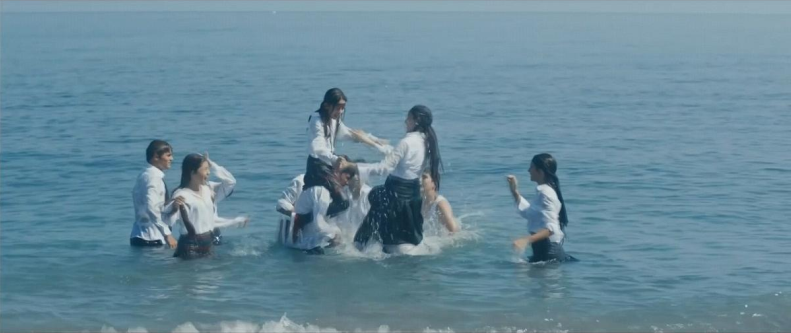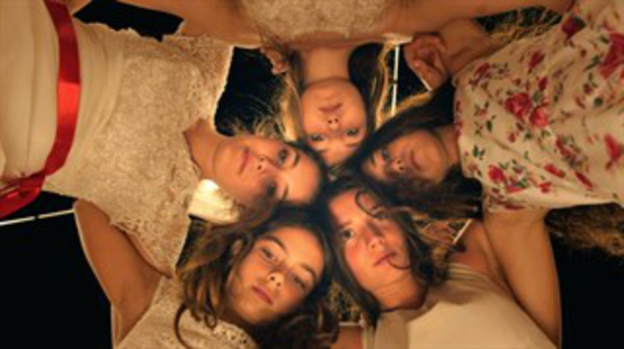I hate Turks. I just wanted to get that out of the way. No, I’ve never actually met a Turk that I know of, except in Western literature, where they have been universally reviled. I should probably add that it’s always Turkish men in the books. Turkish women don’t make a lot of appearances. And, after Mustang, I’m okay with Turkish women.

Which is actually a pretty traditional double-standard.
If you’ve seen the trailer, you know that Mustang is the story of five sisters who are suddenly taken from a pretty liberal lifestyle to one of near imprisonment in their own home. What you don’t know is when this is or why this is. We’ve seen a number of films about the Iranian revolution, where this sort of thing happened on a national basis back in the ’70s, but nothing about Turkey. So I was curious about this film.
Which brings me back to hating Turks. Though, in fairness, they probably aren’t exceptional in this part of the world. As it turns out, Mustang is the story of a modern Turkish uncle that has taken in his five orphaned nieces. After a little anodyne horseplay with some boys at their school comes back to their grandmother as obscene behavior—bizarrely obscene over-the-top behavior—the uncle has a fit and starts erecting a prison around the house until he can get them all married off.

This is what they’re doing that gets them in trouble, the harlots.
The girls seems to be between about 11 and 17 in age. The story is told from the point-of-view of the youngest, feistiest one, who has the right idea by immediately calling out the witchy old gossip who lied to their grandmother.
And so these five beautiful young girls are systematically destroyed by the uncle, whose behavior seems somewhat comical at first, but becomes increasingly sinister as the movie wears on. This is well supported in terms of both how he reacts to each new outrage, and as his character is revealed over time.

Turkish Girls In Prison
The Boy and I both really liked it. Director Deniz Gamze Ergüven (who co-wrote with Alice Winocour) puts together a very plausible scenario she claims is based on her hometown, and I suspect the offense some Turks have taken to it are precisely because it’s right on the nose. On the other hand, it doesn’t change my opinion of Turks one way or the other, really: I’m just as shallow and ill-informed as I was before seeing this movie.
So, as a movie, it’s pretty darn good. A lot of suspense. The girls are lovely and the movie manages to flesh them all out in its hour-and-a-half-ish runtime. The ending may have been too good, but I’m not going to complain. This is a rare situation where we’ve seen all the foreign language Oscar nominees (except one, A War) before the actual ceremony, and it would probably be my pick. Maybe Labyrinth of Lies. Theeb, while also good, kind of petered out at the end. Don’t get me started on Son of Saul.
I’m going to go into spoiler territory now, so stop reading if you wish to be as pristine as a Turkish bride on her 11th birthday.

If the sight of five girls upsets you, you’re deranged.
Seriously, very spoilerrific. Turn back now lest ye read stuff you don’t wanna.
The matter of the girls’ virginity is a big deal in this movie (and in Muslim culture, generally) but there’s a jarring moment when one of the girls confesses (to her sister) to having sex with her boyfriend. But it’s okay, she reassures her, because it’s anal sex, which preserves the virginity. This was sort of shocking as the girls really do seem very innocent—and the play that got them into trouble very much was.
Later, however, we learn that the uncle has been molesting the girls. We don’t get details since the story is told from the youngest sister’s point-of-view, but it all falls into place: The uncle is deathly worried about the girls’ virginity while at the same time raping them. So where does a young girl (without a lot of exposure to Western media) get the idea to get around the virginity problem by having anal sex?
Later, the middle girl has shockingly casual sex with a random guy. That also falls into place with the sexual abuse. So, in essence, the irony is that the guy most paranoid about the purity of the girls is the guy busy sullying them. Maybe not irony so much as “yeah, that’s how it goes”.
Anyway, check it out. Despite the dark moments, and the ridiculously medieval world, there’s a lot of positivity and optimism here.

And at least one gets a happy ending.

One thought on “Mustang”